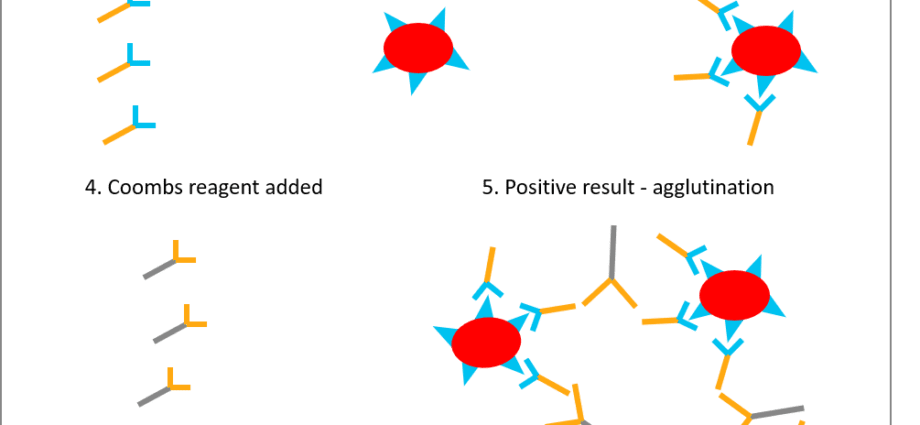Contents
Irregular agglutinins
Definition of the analysis of irregular agglutinins
The agglutinines are antibody, that is, molecules produced by the immune system to “spot” foreign agents.
The term “irregular agglutinins” denotes antibodies directed against certain molecules (antigens) present on the surface of the cells. Red cells.
These antibodies are “irregular” because they are abnormal, with a potentially dangerous effect.
Indeed, they risk turning against the patient’s own red blood cells and attacking them, in a way.
The search for irregular agglutinins (RAI) is therefore a necessary examination in many situations, including pregnancy, to avoid this type of complication.
The presence of these abnormal antibodies is usually explained by the previous realization of transfusions or by pregnancies, in women. Thus, during a transfusion or during a pregnancy, “foreign” blood (that of the donor or the fetus) comes into contact with the blood of the individual. In response, the immune system produces antibodies directed against these foreign red blood cells. During a second exposure (new transfusion or new pregnancy), these antibodies can react strongly and cause destruction of red blood cells, which can have serious clinical consequences (transfusion shock, for example).
In a pregnant woman, the presence of this type of antibody can cause, in some cases, a serious disease called hemolytic disease of the newborn.
Irregular agglutinins can also result from autoimmunization (immune system dysfunction). These are then auto-antibodies, directed against antigens of the patient himself.
Why perform an irregular agglutinin assay?
RAI aims to demonstrate the presence of antibodies directed against red blood cells.
These antibodies are of several types (depending on the molecule they target).
They are potentially dangerous in case of transfusion or pregnancy.
The RAI is therefore systematically carried out:
- in any person likely to be transfused
- after any transfusion (as part of haemovigilance monitoring)
- in all pregnant women
During pregnancy, RAI is systematic at least twice in women without a history of transfusion (before the end of the 2st month of pregnancy and during the 8st and / or 9st month). It is more common (at least 4 times) in Rh negative women (approximately 15% of the population).
This examination aims to prevent transfusion or fetal-maternal accidents (severe anemia, hemorrhages, jaundice).
For example, such accidents can occur when a woman has rh negative (negative blood group) and is pregnant with a rh positive man. During the first pregnancy, the blood of the fetus (if it is Rh +, too), does not come into contact with that of the mother, so there is no problem. On the other hand, during childbirth, the two bloods come into contact and the mother will produce anti-Rhesus positive antibodies. This contact can also take place in the event of miscarriage or voluntary termination of pregnancy.
During a second pregnancy, these antibodies can cause a miscarriage (if the fetus is Rh + again), or a hemolytic disease of the newborn, that is to say a massive destruction of the red blood cells of the baby. . To prevent this complication, it suffices, during each childbirth, to inject the mother with an anti Rhesus (or anti D) serum, which will destroy the few red blood cells of the baby which have passed into the maternal circulation and prevent immunization. .
Procedure for the analysis of irregular agglutinins and results
The examination is carried out by simple blood test, in a medical analysis laboratory. The patient’s blood is contacted with a variety of donor cells (which represent the diversity of antigens against which irregular agglutinins can form). If the agglutinins are irregular, they will react in the presence of these cells.
What results are expected by the search for irregular agglutinins?
The examination is either negative or positive, showing or not the presence of irregular agglutinins in the blood.
If the screening is positive, it will be necessary to determine precisely which antibodies they are (in order to know against which molecule exactly they can react).
In the event of a subsequent transfusion, this allows the selection of compatible blood for the patient.
During pregnancy, the presence of irregular agglutinins is not necessarily dangerous. Very often, these antibodies present no risk to the child (they are not very “aggressive” or the fetus may be compatible).
However, the proper development of the fetus will be strictly controlled.
The so-called “anti-D” agglutinins (anti-RH1, but also anti-RH4 and anti-KEL1), in particular, require regular monitoring and dosing (at least once a month until childbirth and even all 8 to 15 days in the third trimester). The doctor will explain the risks and the methods of pre and postnatal follow-up to you.
Read also : Our fact sheet on anemia All you need to know about bleeding |










